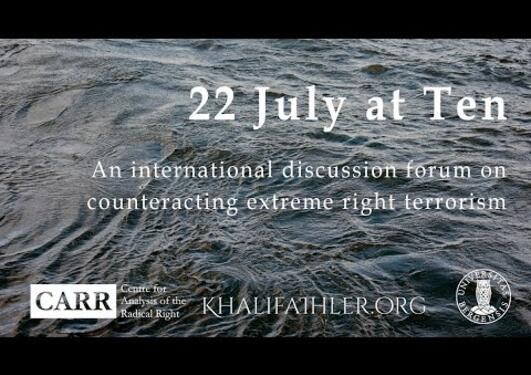High-level summit at the University of Bergen: Global counter-terrorism after 22 July
What can society and global organizations do better to stop right-wing extremist radicalization and terrorist content online?
22 July 2011 at Ten: Commemoration and Commitment
Main content
Norway's darkest day destroyed lives and local communities. The terrorist attack also raised acute questions about online radicalization and destructive lone actors motivated by right-wing radical extremism.
"10 years after 22 July 2011, there is a need to lift the effort against right-wing extremist terrorism to a global level. The discussion is no longer simply about the terrorist Anders Behring Breivik, but about a number of actions by broadband terrorists and lone wolves, some of them directly inspired by him," says Professor Erik Tonning of the University of Bergen.
An international summit
On 25-27 August 2021, four research groups at the University of Bergen are hosting an international summit on this topic in collaboration with Utøya survivor Bjørn Ihler's Khalifa Ihler Institute, and the British expert group Centre for Analysis of the Radical Right. They have brought together representatives from academia and civil society, Norway’s Ministry of Foreign Affairs, the governments of New Zealand, the United States and the United Kingdom, technology giants Google, Microsoft, Facebook and Twitter, UN agencies, European Commission security advisers, expert groups, and a number of other organizations involved in the fight against terrorism.
"The best way to remember the cruel and tragic attack in Norway ten years ago is to jointly commit to further work to stop extremist radicalization and terrorist content online," Tonning says.
How is it possible to prevent terrorist manifestos from spreading online, or for terrorist groups to communicate freely there? What practical and ethical challenges does this entail? How should we deal with these in line with the principles of the Universal Declaration of Human Rights?
A firm commitment to change
"Norway strongly supports the international fight against Extreme Right Wing Violence and Terrorism. Conspiracy theories and extremist ideas shared online may accelerate radicalisation. As a committed member of the Christchurch Call to Action, Norway works to prevent this trend. This seminar is a great opportunity to advance the conversation on how to take this work forward," says State Secretary at the Ministry of Foreign Affairs, Jens Frølich Holte.
Through the three-day discussion forum, the organizers seek to build on existing frameworks and international cooperation. The forum will be based on the Christchurch Call to Eliminate Terrorist and Violent Extremist Content Online, an initiative where Norway is one of the founding nations, issued in the wake of the attack that murdered 51 innocent people in New Zealand in 2019.
"We have gathered global stakeholders at a high level who can make the big decisions in this area and contribute resources to follow them up," Tonning says.
The goal is to establish completely new mechanisms to counter the spread of harmful material online and the global effect of local terrorist attacks.
You may see recordings of the conference summary and concluding remarks here:
